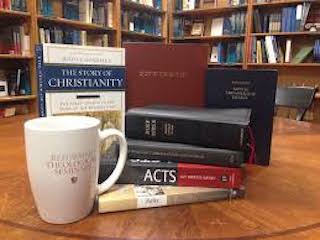
Course syllabi in a moment. But first a word about calendars.
Calendars do more than remind you about upcoming events. They are an essential part of planning and the effective use of time.
At RTS, I want you to learn how to make your calendar an ally in completing your studies.
A good place to begin is your course syllabi. When you access a syllabus for the first time, review it carefully. Then go to your calendar.
- Add each class session to your calendar. For example, last spring my Classics of Personal Devotion class of met on these dates: 2/3, 3/2, 3/23, and 4/20.
- Add all work due on the date it’s due. That includes all quizzes, tests, and papers.
- Think carefully about the amount of reading required. Students in Classics of Personal Devotion were required to read all or portions of Arthur Bennett, The Valley of Vision; Andrew Bonar and Robert Murray M’Cheyne, Memoirs and Remains of Robert Murray M’Cheyne; Brother Lawrence, The Practice of the Presence of God; John Calvin, John. A Little Book on the Christian Life; D. A Carson, Praying with Paul: A Call to Spiritual Reformation; John Newton, Letters of John Newton; Leland Ryken, The Soul in Paraphrase: A Treasury of Classic Devotional Poems; and Campegius Vitringa, The Spiritual Life.
- If you find the amount of required reading challenging, do this: build a daily reading schedule into your calendar. Break down your readings into manageable portions. Do this for all your readings in every course. Each day have a reading goal and meet it. I follow this practice. Each year I like to read one or two lengthy works in theology. A few years ago, I read again Calvin’s Institutes. The following year I read Wilhelmus à Brakel four volume The Christian’s Reasonable Service. For twenty minutes, I read a small number of pages five days a week and easily meet my reading goals.
- This class memorized Psalm 103. Decide how many verses you will need to memorize each week, and enter those verses into your calendar.
- If you already have your syllabus, start reading now! Read as much as you can before the semester begins.
- Use fall break as a reading and writing week. A seminary semester is fifteen weeks of intensive work. Keep the Sabbath. Build in times of rest and refreshment. But a nine-day break from your studies in the middle of the semester may not be the optimal use of your time.
- Don’t wait until classes start to work on assignments. Think about term papers and book reviews. I assign several of them each semester, I will have several students who turn their term papers and book reviews before classes start. I grade and return promptly.
Get off to a good start this semester. Well before your first class, coordinate your syllabi and calendar.